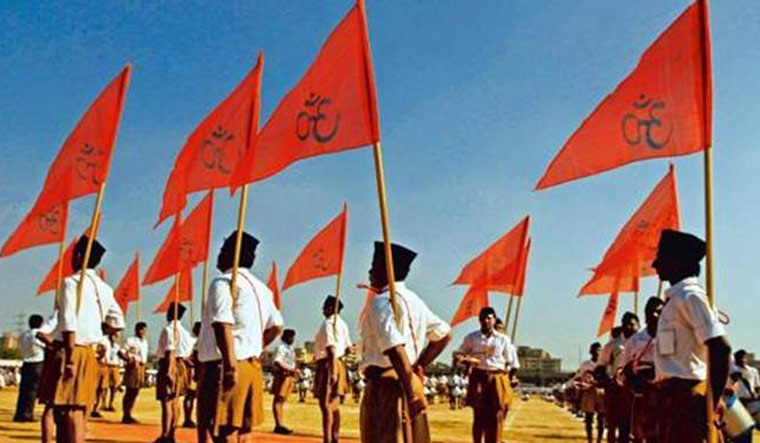Jaipur: In Rajasthan, the Rashtriya Swayamsewak Sangh (RSS) has shown its value to the BJP by turning the tables on the Congress in the Lok Sabha election even at a time when the state is under Congress rule.
The RSS has an excellent work record in the western belt of Rajasthan which comprised crucial Lok Sabha seats including Jodhpur and Barmer.
Its different units including Kisaan Sangh, Mazdoor Sangh and a separate unit active in border villages have been active on the ground for the last several years contributing to social causes irrespective of caste barriers and as a result, they won the favour of the local masses.
Also their gestures of organising inter-caste marriages and cow welfare, among many others, made their workers earn the people’s trust.
Eventually, it was not a tough contest for the RSS when Chief Minister Ashok Gehlot’s son was fielded from Jodhpur against Union Minister Gajendra Singh Shekhawat who also has an RSS background and romped to victory.
The organisation was firmly determined to show its strengths, virtually making it a Chief Minister versus RSS contest in Jodhpur. Surprisingly, all caste equations were neutralised on these seats when Jats, considered rivals of the Rajputs, also voted for Shekhawat who won by around 2.7 lakh votes.
Similar was the story of the Barmer seat which witnessed Congress’ Manvendra Singh fielded against the humble Kailash Chaudhary who was a farmer leader and yet again an RSS worker.
Here too, Chaudhary won by 3.23 lakh votes brushing aside all caste equations by garnering votes of Rajputs too.
As RSS workers were silently working on booth analysis and campaigning for their candidates across the state, Chief Minister Gehlot many a time openly criticised the working of the RSS during his press conferences and public gatherings during the election.
Twice in May, Gehlot attacked RSS chief Mohan Bhagwat, advising him to merge with the BJP and “play politics on the front foot”.
In one of his tweets, he said: “The RSS must do politics on the front foot. The Congress is strong enough to fight back. Let’s fight it out in the open. Let’s see who has what policies, what programmes and what ideals. Let’s say what we want and then let the people decide. Politics from behind the curtains is not in the interest of the country.”
“The way RSS leaders are giving covert support to the BJP, indulging in politics and enjoying its benefits while staying behind the scenes, it would be better if the Sangh announces itself as a political party. They should take my advice very seriously, discuss it and come forward,” Gehlot had said.
“It seemed the Rajasthan Chief Minister had got an inkling that his son was losing the battle in his home turf and hence he came out openly against us,” says a senior RSS worker.
In fact, the RSS after witnessing the BJP’s defeat in the Assembly election in December, became proactive right from January and worked on a clear strategy.
The workers of around 4,000 RSS ‘shakhas’ in the state proactively went door to door surveying the electorate and classified them in four different categories. The last category which constituted of Congress loyalists was altogether ignored and all emphasis was given to the other three categories to ensure they voted for the BJP.
Their clear plans changed the fortunes of the saffron party which did result in record voting and record victories in many seats in the state.
And the direct consequence of its efforts resulted in the drastic rise in BJP’s vote share which was an increase of around 20 per cent as compared to the 2018 Assembly polls.
The BJP’s vote share was 54.5 per cent as compared to 38.8 per cent in the Assembly polls.
The ground work of booth workers and RSS teams read the pulse of voters and drew them out of their houses to vote in big numbers. Also, fresh voters’ names were added in voting lists with their support.
As a result, 68.22 per cent voting was recorded in the first phase of polling held on April 29 for 13 seats, while in the second phase on May 6, around 63.78 per cent voting was registered on 12 seats. Overall, 66.12 per cent voting was recorded which was the highest voter turnout in the state in the last 67 years.
In 2014, 63.10 per cent voting was recorded.
As RSS was quite active in western Rajasthan, a few seats witnessed over 70 per cent polling in some belts as people supported the BJP due to the social work being done since the last many years and they came out in large numbers to vote.
The RSS has also been working thoroughly in Bhilwara, where BJP candidate Subhash Baheria clinched victory by over six lakh votes. The unit has been quite active with their ‘path sanchalans’ and their cow research centre has been drawing accolades by people of all castes and creeds in this belt.
Another BJP candidate from Chittorgarh, C.P. Joshi, who won by record margin of over four lakh votes, is yet again a soldier of the RSS army who is expected to get a decent berth in the Union cabinet. Advertisements congratulating him were released a day before the counting was done which left the opposition stunned and surprised over his confidence.
(IANS)
